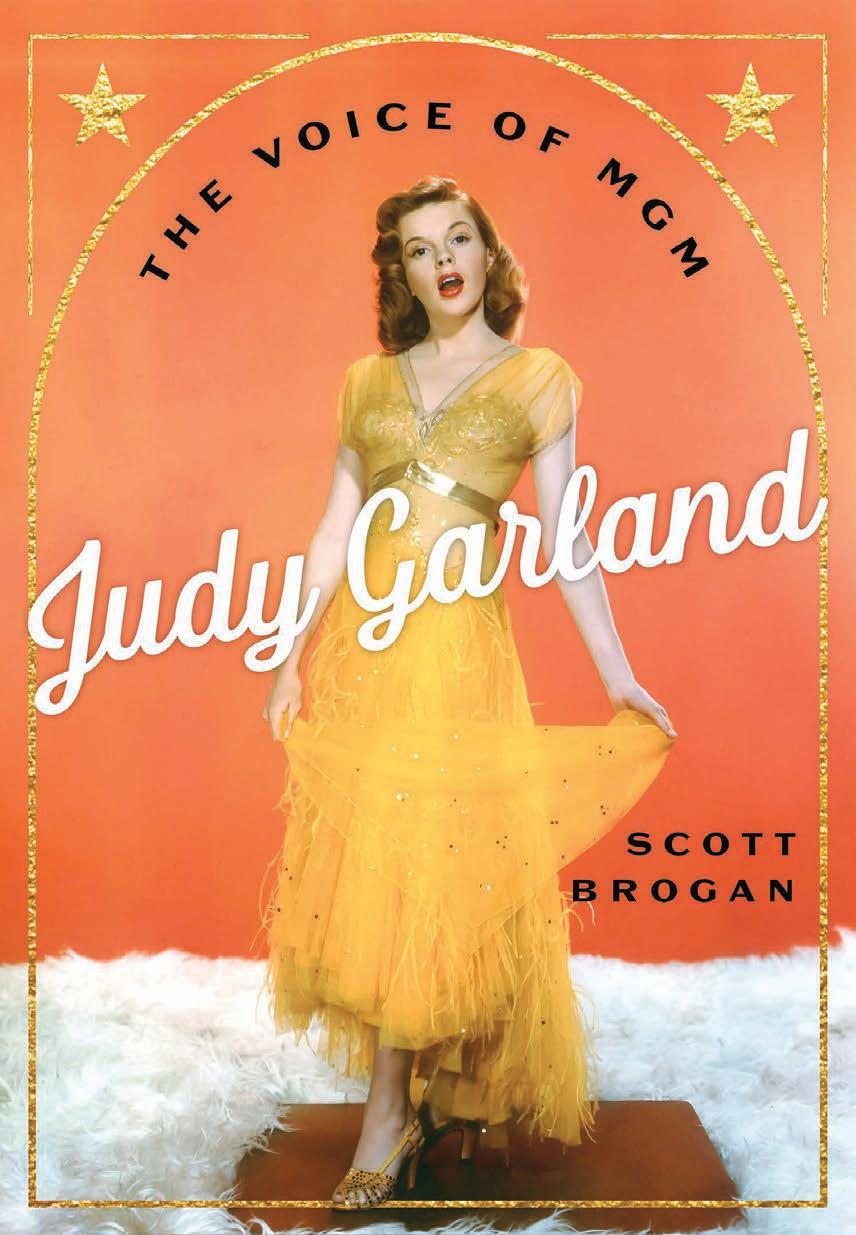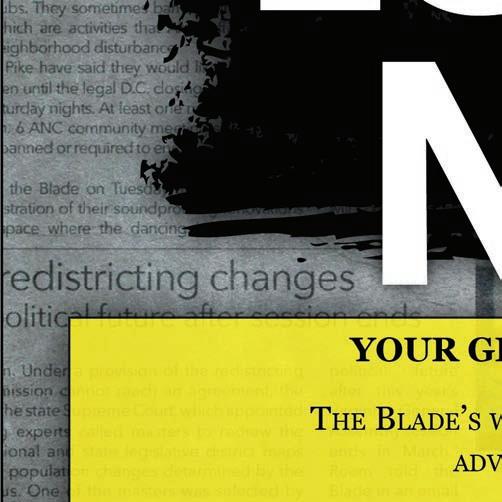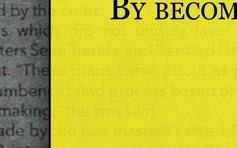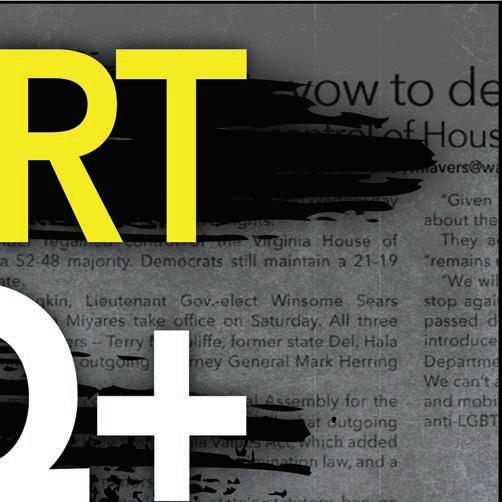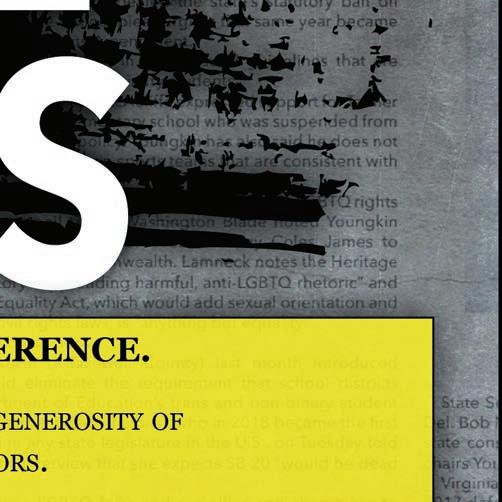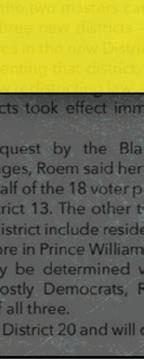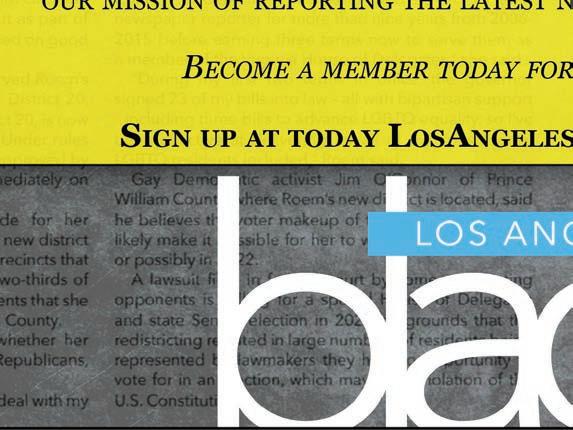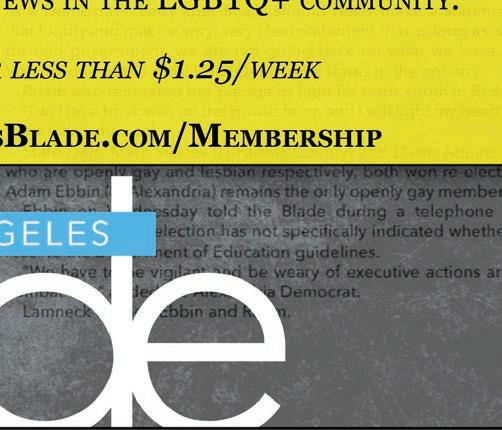Uniting for justice
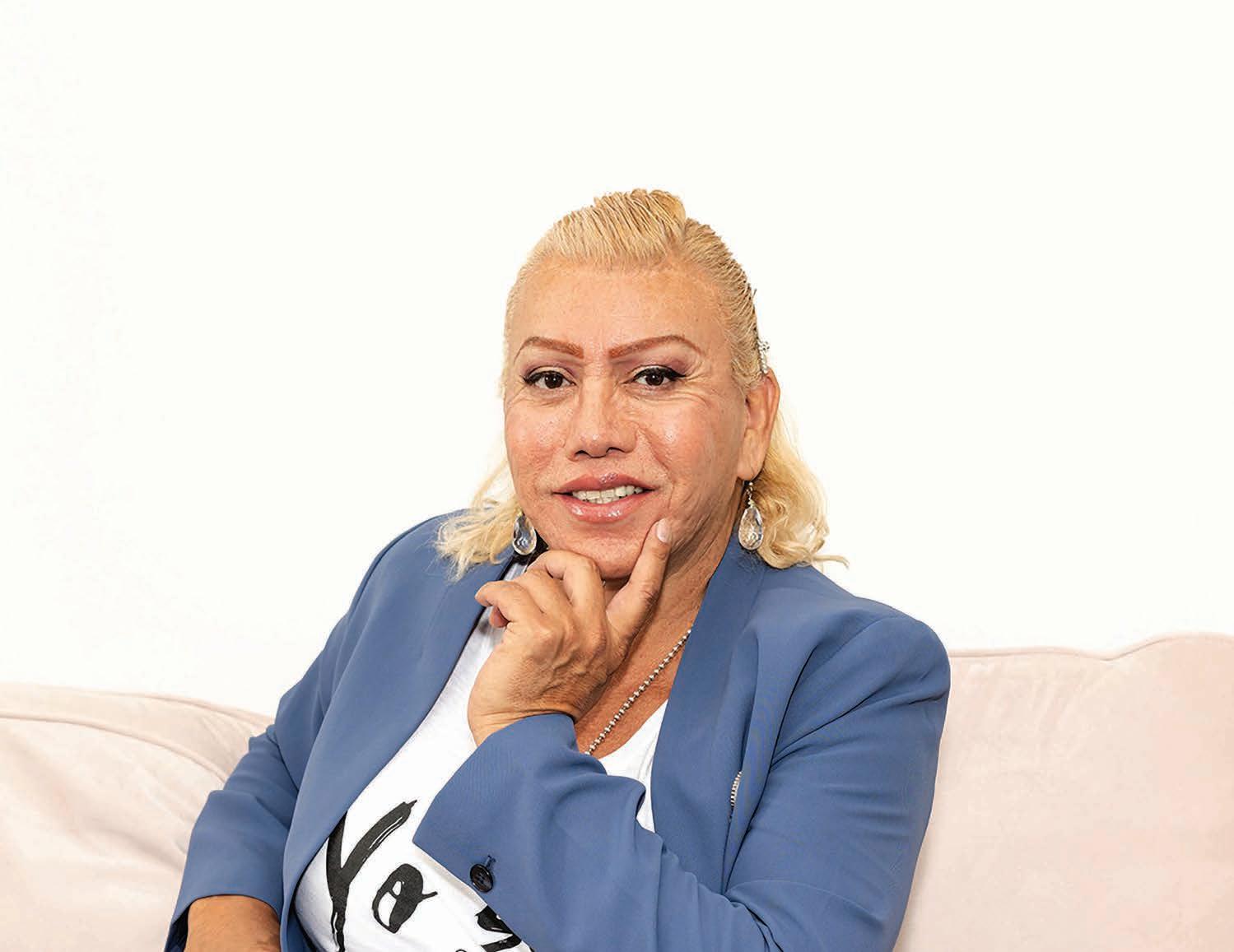
Bamby Salcedo on how TransLatin@ Coalition is leading in this time of attacks, PAGE 02
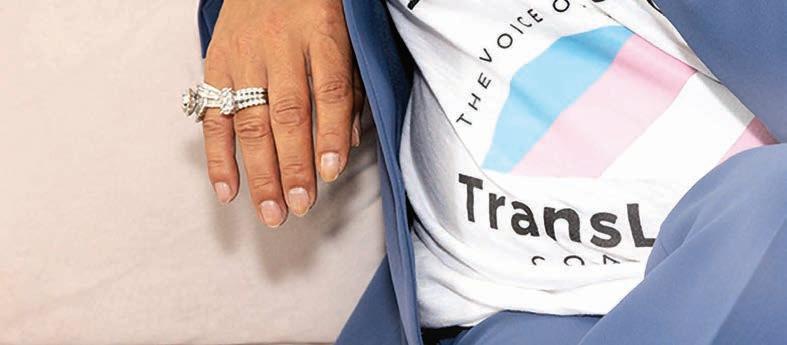





Bamby Salcedo on how TransLatin@ Coalition is leading in this time of attacks, PAGE 02




In the face of state violence, political backlash, and economic sabotage, TLC is responding the way it always has: by organizing, celebrating, and building a better world. Bamby Salcedo is at the helm of this activism.
By ROSE MONTOYA
As ICE raids intensify across Southern California and anti-immigrant sentiment resurfaces in Orange County, trans and immigrant communities are once again being targeted. These crackdowns go beyond enforcement—they’re designed to instill fear. At the same time, a coordinated right-wing smear campaign is attempting to discredit the very organizations working to keep these communities safe.
Last month, the TransLatin@ Coalition (TLC), a cornerstone in the fight for trans, queer, and immigrant rights in Los Angeles, was publicly named by members of Congress. But this was no recognition. It was a calculated attack.
“They’re calling us a radical organization,” said Bamby Salcedo, President and CEO of TLC. “They’re spreading lies, saying we’re using government funding to abolish ICE and the police and to provide abortion access. We do believe in those things—but the funding we receive is used to serve our people.”
Now, that funding is being stripped away.
In the face of state violence, political backlash, and economic sabotage, TLC is responding the way it always has: by organizing, celebrating, and building a better world. Because when our communities are under attack, we show up—stronger, louder, and more united than ever.
Salcedo, herself a proud trans Latina immigrant, has spent decades fighting for those living at the margins. “I always say I am an intersection walking,” she said with a smile. “Our organization is made up of the people most impacted—and we are the ones leading the work.”
In Los Angeles County, roughly one-third of residents are immigrants, the majority of whom are Latino. Unsurprisingly, trans Latinas represent the largest segment within the local trans community.
Yet even within immigrant justice spaces, trans people are often sidelined. “It’s a very hetero-centric space,” Salcedo said. “Most of the time, they don’t even consider the lives and experiences of trans and queer immigrants.”
The TransLatin@ Coalition is actively changing that. As a key member of a broad alliance of more than 100 immigrant-serving organizations across Los Angeles, including CHIRLA and the Filipino Workers Center, TLC helped secure over $160 million in American Rescue Plan funds for immigrant housing, internet access, and legal services.
They also co-created the groundbreaking TGIE (Transgender, Gender-Nonconforming, Intersex Empowerment) initiative, which allocates $7 million in Los
Angeles County’s annual budget to support trans-led service providers. “We don’t just want symbolic policies,” said Salcedo. “We fight for resources. We analyze the budget. We make it real.”
Despite these victories, TLC is now confronting devastating federal cuts.
“Our work has been defunded,” Salcedo said bluntly. “Multiple programs are gone. And we’re not alone— trans-led organizations across the country, especially in the South, are facing the same.”

She pointed to a broader backlash against anything associated with Diversity, Equity, and Inclusion (DEI). “The private sector is pulling back. Philanthropy is scared. Even the same corporations that fund us during Pride are investing in our opposition the rest of the year. It’s hypocrisy.”
Rather than retreat, the TransLatin@ Coalition is calling for bold, collective action.
“Now’s the time for people to step up,” said Salcedo. “We have the strategy. We’re doing the work. But we
need resources—and we need real solidarity, not just statements.”
To respond to the crisis and raise urgently needed funds, TLC is organizing its Walk for Humanity on Saturday, August 24. The event will begin at 9 a.m. in Silver Lake and march to Sunset and Western, featuring live performances, a resource fair, and a unified call for justice.
And yes—it will be joyful.
“This is a call for all people to stand in solidarity with one another,” said Salcedo. “We want to bring together 1,000 people, each raising $1,000. It’s going to be a beautiful day of community and resistance.”
In a surprise announcement, Salcedo also revealed she will debut her first single—a cumbia track inspired by the movement. “It’s about movement in both senses: our political movement, and moving our bodies,” she laughed. “We can’t let them take away our joy. Joy is how we survive.”
When asked what more local leaders can do, Salcedo didn’t hesitate. “Elected officials are public servants. That means serving all people,” she said. “We may be a small population, but we are deeply impacted—and we contribute so much to this city.”
She pointed to data from LA’s most recent homelessness count, which identified over 2,000 trans and gender-expansive people experiencing homelessness. That number exists thanks in large part to years of advocacy demanding the city count and name trans lives. “We have the data now. There’s no excuse not to invest in our people.”
She also uplifted allies like LA County Supervisor Lindsey Horvath and newly appointed City Councilmember Isabel Urado, the first openly LGBTQ+ person to hold her seat. “They’ve seen our work and are fighting to invest in it,” Salcedo said. “We’re hopeful we’ll see another $10 million in city funding. But we need the community behind us.”
At the end of our conversation, I asked Salcedo what she would say to undocumented, queer, and trans Angelenos who are feeling afraid right now.
Her answer was clear, powerful, and full of love:
“You are a divine creation. You deserve to exist in this world. Walk your path with dignity, love, and respect—for yourself and for others. You belong. You are part of me. You are part of us.”
If standing with trans immigrants, resisting federal rollbacks, and dancing in the streets sounds like your kind of solidarity, join the TransLatin@ Coalition on August 24. Because when we show up together, we protect each other. And when we dance together—we win.


here, still
Trans activist Arri recounts her family’s terrifying brush with ICE in Orange County and is channeling her pain into advocacy
By ROSE MONTOYA
Last Saturday, what began as a routine trip to a local liquor store in Orange County quickly turned into a terrifying encounter with Immigration and Customs Enforcement (ICE) officers, one that left Arri’s entire family rattled.
“We spotted them when we walked out of the store,” Arri recalled. “We all kind of just stopped in our tracks as we were walking.”
The officers arrived in unmarked white SUVs, wearing tactical vests and gear. “They weren’t masked up. You could see their faces.” That’s when things escalated. “They started slowly moving forward as we were leaving… they started following us. And this entire time I could see in the rearview mirror and in the side mirror that they were laughing.”
Although her father has a green card, fear took hold. He refused to drive home and reveal their address. “ICE made the exact same U-turn… my dad started getting scared, so he sped off and went onto the main street… luckily, we eventually lost them.”
But the emotional damage was already done.
“My dad was paranoid the entire time on our way home… he didn’t even want to leave the house after that. He unbuckled his seatbelt immediately, ran inside the house,
locked himself in, and was completely shaken.”
Arri’s grandmother, who is undocumented and lives with the family, has a different kind of courage. “My grandma’s very fearless,” Arri said. “She’s strong because of everything that she’s been through in her life… She still goes out every day, takes the bus to work, and faces these risks head-on.”
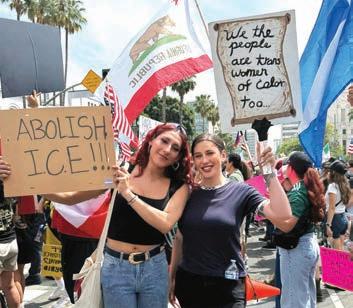
What struck Arri most was the blatant racial profiling. “Obviously no one has a sticker on their forehead that says ‘we’re illegal,’ but they basically just racially profiled us because we are all darker-skinned. Like we obviously look Mexican.”
Even more disturbing was what Arri learned later. “I checked that Ice Block app later that day. They were taking people off buses just two streets down from where we were.”
Though Arri is a U.S. citizen, she has witnessed this violence firsthand before. “My mother was deported when I was in high school, around Trump’s first term.” That trauma continues to shape her life. “During transitioning, I felt like I needed my mother… to guide me through stuff like womanhood… I still need my mother to this day.”
Now, Arri channels her pain into advocacy. “This isn’t my first time protesting about this matter… I will always stand for my community… I fuel myself with just being fearless. I’m a U.S. citizen. I was born here. I’m able to speak out for immigrants who are scared to speak up out of fear of being deported.”
Her words carry not only personal weight but a fierce demand for justice. “Children have died in ICE custody. Women. Men… treating these people like they’re animals, even when they have no criminal backgrounds.”
Her story is not just about fear, it is about refusing to let fear win. She calls on those with privilege to show up. “We are the voice for those people who are not able to speak
The Los Angeles Blade, HuffPost’s Lil Kalish, and GALECA’s John Griffiths took home top awards at Press Pride Prom, a benefit and awards ceremony held at Grand Central Air Terminal on July 26, 2025 By ALEXANDER RODRIGUEZ
Members of the journalism industry gathered together this last weekend to celebrate the nominees and winners for three inaugural journalism awards for Southern California journalists and newsrooms who championed LGBTQ+ stories in 2024. The Los Angeles Chapter of NLGJA: The Association of LGBTQ+ Journalists presented this Press Pride Prom inaugural event.
Over 200 attendees gathered in Glendale at the historic Grand Central Air Terminal to celebrate. The evening was presented by ABC7 and hosted by award-winning journalist Tracy Gilchrist. The ceremony also included a moving performance by the Trans Chorus of Los Angeles and a hilarious appearance by drag king Charles Galin King. The Los Angeles Blade took home the first award of the evening, the Excellence in
LGBTQ+ Reporting Newsroom Award. The award recognizes a news outlet whose coverage of the queer and trans community is well-informed, complex, varied, and intersectional, with a track record of promoting The Association of LGBTQ+ Journalists’ mission to advance fair and accurate coverage of LGBTQ+ communities and issues. The other nominees were LAist and Variety. Team members of the Blade took to the stage, including publisher Alexander Rodriguez, writers Rose Montoya, Rob Salerno, and Joel Medina, and former editor Gisselle Palomera to accept the award.
The evening also included the presentation of the Queer Beat Award for Excellence in LGBTQ+ Reporting, honoring a single story or series that demonstrates care, skill, and a commitment to fair and
accurate reporting of LGBTQ+ themes, issues, and people. This year’s winner was “She Was Supposed to Be at Pulse Nightclub — And Club Q. Now She’s Fighting To Keep LGBTQ+ People Safe” by Lil Kalish for HuffPost.
Another special moment for the Blade took place in the presentation of The Troy Masters Legacy Award for Visionaries in Media, presented in collaboration with the Blade and LA NLGJA, honoring a journalist or news media professional whose work reflects a dedication to the craft of journalism and a commitment to setting the stage for the next generation of LGBTQ+ industry leaders. The award is named in honor of Troy Masters, veteran queer journalist and former publisher of the Los Angeles Blade, who passed away last year.
for themselves… This should make you want to stand up… Who can look at an innocent child, an innocent family being ripped apart, and not have a heart?”
“An attack on the immigrant community is an attack on all of us. If they get away with this, who are they going to go after next?” Arri warns. She believes the threat extends far beyond immigrant families. “They don’t want to make America great. They want to make America white.”
As attacks on immigrant communities, trans people, and people of color escalate nationwide, stories like Arri’s are a clear warning: these are not isolated incidents. They are symptoms of a coordinated assault on vulnerable communities, and a wake-up call for the rest of us.
Arri’s Call to Action: Organize. Vote. Show up. If you are undocumented or need support, organizations like CHIRLA, RAICES, Trans Latin@ Coalition, and local mutual aid networks provide legal help, housing, food, and resources. If you are a citizen, use your privilege to demand justice, share stories like Arri’s, and protect your neighbors. Because, as Arri reminds us:
“You’re not alone. Don’t lose hope. Things will get better. There will always be people who will continue to fight for you.”
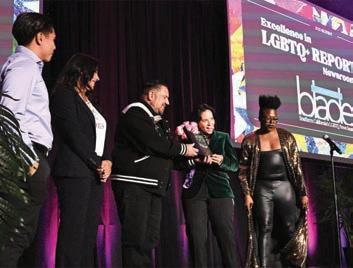
This year’s winner was John Griffiths, founder of GALECA: The Society of LGBTQ Entertainment Critics and Dorian Awards. The final presentation was presented by the office of State Assembly member Rick Chavez Zbur, for District 51. Joshua Marin-Mora gave a moving speech and delivered proclamations to each of the winners.
We are honored by our win and extend our congratulations to the LA NLGJA for a successful and important evening. A big thank you to our readers, who continue to support our efforts.

From her time in the courtroom to the Senate floor and the White House, Harris has built a career within the political system. But her latest message hints at a shift in strategy.
By ROSE MONTOYA
Vice President Kamala Harris announced today that she will not run for Governor of California in 2026, putting to rest long-standing speculation about her political future. In a public statement, Harris said she spent the past six months reflecting on “the best way for [her] to continue fighting for the American people and advancing the values and ideals [she holds] dear.”
From her time in the courtroom to the Senate floor and the White House, Harris has built a career within the political system. But her latest message hints at a shift in strategy.
“We must be willing to pursue change through new methods and fresh thinking,” she wrote, “committed to our same values and principles, but not bound by the same playbook.”
While stepping back from the governor’s race, Harris made it clear she’s not stepping away from politics. She plans to campaign for Democrats nationwide and suggested more details about her next chapter are on the horizon.
Her announcement comes at a time when the Democratic Party is facing urgent questions about whether it will fully defend trans lives amid rising attacks. California Governor Gavin Newsom recently called it “deeply unfair” for transgender athletes to participate in girls’ sports. Former Transportation Secretary Pete Buttigieg echoed the same framing, saying, “most reasonable people agree that it’s a serious fairness issue.” These are not harmless statements; they are capitula-
tions to anti-trans narratives that frame our right to exist and participate as something debatable.
These statements from two of the party’s most visible figures aren’t outliers either; they reflect a broader trend of Democratic leaders hedging their language or pandering to the center instead of standing firmly for trans people’s dignity and rights. While Harris didn’t mention trans issues in her statement, her record is also mixed. She has caused harm in the past but has shown signs of growth, becoming more publicly supportive of trans rights in recent years. Still, symbolic gestures are no longer enough. The real question now is: what comes next?
As Harris, Newsom, and Buttigieg emerge as likely contenders for the 2028

Democratic presidential nomination, transgender Americans and our allies are paying close attention. We are tired of being treated as a liability, a distraction, or a political bargaining chip. We are not a wedge issue.
We are voters. We are organizers. We are human beings. And we deserve to know which of these potential leaders will truly fight for us, not just when it’s politically safe, but when it matters most.
Gay Parent Magazine’s Facebook page deleted in attack
By LOU CHIBBARO JR.
Gay Parent Magazine and the Washington Blade have taken steps to alert LGBTQ media publications about what appears to be an organized scam operation that deleted Gay Parent Magazine’s Facebook page and attempted unsuccessfully to infiltrate the Blade’s Facebook page.
The action by the unidentified scammers targeting Gay Parent Magazine and the Blade appeared to be aimed at LGBTQ media outlets with the intent of harming or disabling LGBTQ supportive publications, according to Gay Parent Magazine editor and publisher Angeline Acain and Blade editor Kevin Naff.
“We have strong reason to believe our Facebook page hacking was politically motivated,” Acain said in a July 7 statement. “We were targeted by people who don’t support LGBTQ parents,” she said.
Both Acain and Naff said they were contacted via email by someone claiming to be podcaster Jennifer Welch, a pro-LGBTQ commentator, inviting them to appear as a guest on her podcast.
“When I accepted, she emailed to set up a Zoom call to review technical requirements because she conducts her interviews via Facebook Live,” Naff said. “When I connected to Zoom, she wasn’t on camera and a
man’s voice then said he handles her technical support. He instructed me to log into the administrative page of the Blade’s Facebook account and to share my screen,” Naff said. “That’s when I became suspicious and declined the request and ended the call.”
Naff said he had not heard anything from them since that time.
Acain told the Blade she now regrets that she agreed to provide access information to her publication’s Facebook page when she too was invited to appear as a guest on a Jennifer Welch podcast.
“I did somehow give them access,” Acain said. “I don’t know exactly how they did it, but whatever I did, they knew what to do to gain access.”
In her July 7 statement, Acain said, “In this attack, bad actors posed as liberal podcast hosts and invited me to be a guest saying the podcast would be live streamed on their Facebook page. They then hacked into Gay Parent Magazine’s Facebook page and removed all of our followers. The next thing I knew our Facebook page was gone.”
She said the Facebook page had 30,000 followers before it was hacked. Since that time, she said, she and her team at Gay Parent Magazine have rebuilt the Facebook page and continue to take steps to rebuild
its audience and followers.
Acain also says in her statement that her publication’s Facebook hacking took place about five months after the Facebook page was “attacked by trolls posting hateful comments at LGBTQ parents.” She said the barrage of hateful postings began shortly after Donald Trump took office as president.
“After weeks of reporting the hateful comments, blocking trolls, and limiting who could comment, the hateful rhetoric eventually stopped,” she said.
“In the 26 years since I’ve been publishing, this has never happened before,” she told the Blade. “Since Trump has been president all of this has been happening.”
“This is clearly an organized right-wing effort targeting queer media outlets,” Naff said in his own statement. “I immediately reached out to contacts in LGBTQ media warning them of this scam,” he said, adding that his personal Facebook account was also targeted by someone who posted anti-gay slurs.
The anti-LGBTQ postings that Acain reports began to target Gay Parent Magazine’s Facebook page took place after two prominent LGBTQ advocacy organizations, the Human Rights Campaign (HRC) and GLAAD, issued strongly worded statements criticiz-
ing Mark Zuckerberg, the CEO of Meta, the company that owns and operates Facebook and other social media outlets, for ending longstanding anti-LGBTQ hate speech polices.
In a Jan. 7 statement, GLAAD said the policy changes put in place by Meta “removed and adopted several sections of its Hateful Conduct Policy, rolling back safety guardrails for LGBTQ people, people of color, women, immigrants, and other protected groups.”
In its own statement released Jan. 15, HRC states, “When Mark Zuckerberg announced sweeping changes to Meta’s content moderation policies, he framed the move as a bold defense of free speech. But many, especially members of the LGBTQ+ community and allies, worry about what this means for safety on Meta’s platforms and fear this marks an open invitation for Meta users to engage in anti-LGBTQ+ abuse that will disempower and marginalize the community.”
Meta has said the policy change was aimed at increasing free speech and curtailing censorship on its social media platforms like Facebook.
The Blade couldn’t immediately confirm whether any other LGBTQ media outlets have been targeted by anti-LGBTQ scammers.

Considered by many to be DTLA’s queer haven, the bar says it is only a few slow weekends away from shutting its doors forever
By JOEL MEDINA
Like most evenings at Precinct DTLA, the energy is tangible.
Located in the heart of Downtown Los Angeles, the second-story LGBTQ+ venue has been a mainstay of the area for the past decade. From its world renowned parties to its weekly trivia nights, your average patron will always experience the bar’s trademark sense of grungy solidarity the moment they step into the space. And Saturday, August 2nd, is no different.
It is packed to the brim with queer locals of all identities, with people stocking up on drinks at the main bar, jumping along to music on the dancefloor, and lounging at the breezy patio as they prepare for the 2000s-themed drag show at midnight. But underlying all of this easy excitement is something nobody likes in a gay club: worry.
People didn’t come together just to dance along to classic bops — they’re trying to support their favorite bar, which recently announced it was only a few slow weekends away from closing its doors.
In a message posted last Friday on Precinct’s social media accounts, the venue made the shocking announcement that it was in financial crisis. The statement read, “Like many small businesses, we’ve taken hit after hit — from COVID shutdowns and ICE raids to citywide curfews and the ongoing decline of nightlife. But what we’re facing now is even more devastating.” This post described how the space was contending not only with the issues listed, but also with a lawsuit by a former employee alleging that she was discriminated against due to her status as a White woman. It’s been a taxing legal battle, emotionally and physically, for the bar’s staff; the plaintiff’s attorney has an alleged track record of discriminatory behavior. Each employee is worried not only about their job, but also about losing what has become a true haven for DTLA’s queer community.
“Nightlife has shifted significantly in recent years,” said Precinct’s general manager, Jeremy Lucido, when he took a moment to speak with the LA Blade in the back of the club between boxes of seltzers and rushing employees. “For queer spaces in particular, the decline has been ongoing. Since the rise of smartphones, hookup apps, and social media, the need for in-person gathering spaces has steadily diminished — and with it, the number of queer bars.” It’s a disheartening truth that has been a recurring feature in recent news cycles; Californians were shocked only a few weeks ago when San Francisco’s historic Oasis nightclub announced it would be shutting down due to financial troubles.
When asked about how the increase in ICE Raids and rising anti-LGBTQ+ rhetoric may have affected Precinct, Lucido expressed, “These attacks, especially the ones aimed at our trans siblings, are deeply disheartening…there’s a clear effort to erase us, and that makes safe spaces more vital than ever. At Precinct, we’re committed to being a haven for the entire queer community. We need to ‘protect the dolls’ at all costs.” ICE Raids have continued to disproportionately target community centers in DTLA, leading not only to a decrease in patrons, but businesses closing up and vacating the historic area.
These issues and more have greatly affected Precinct, with the ongoing lawsuit only exacerbating them. Lucido was unable to discuss the issue further due to legal liability. But queer Los Angeles remains vocal that Precinct is vital to the community.
“Precinct is one of the more welcoming LGBT places in LA,” said Wilson C., a patron who excitedly detailed how much the bar means to him after moving to California only two years ago. “It attracts a different, more diverse crowd than what I’ve seen in [West Hollywood], and it’s been easy for me to go out on a random night and have a good time.”
Along with attendees, the workers themselves spoke about how Precinct is more than just a job for them. The Blade had the pleasure of chatting with the bubbly Ms. Nicky Jackson, who has spent the past decade managing the door (and everything else necessary) at the venue’s many parties. “Precinct is different because they’re all encompassing and accepting of everyone,” she said, taking a break between warmly greeting and stamping
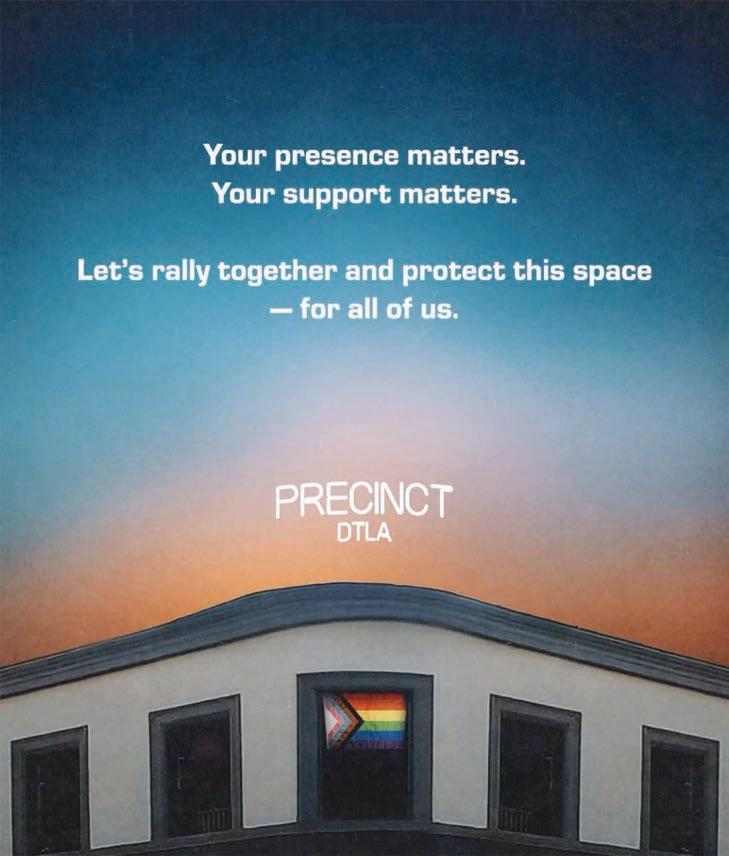
the inner wrists of guests. “It doesn’t matter who or what you are, they’re very, very welcoming [and take] everybody in… a lot of people feel like they have never been accepted before they’ve been here.”
While there has been a resounding worry from Precinct’s thousands of supporters across Los Angeles, there’s also been a shocking amount of hope not only through the many people coming out to fill the space, but in the local celebrities like RuPaul’s Drag Race: All Stars winner Alaska Thunderf*ck who are dedicating their time to help fundraise and keep Precinct afloat. It’s been a heartwarming moment of community, but Lucido reminds potential patrons that even with all of this, the bar is still not safe from shutting down.
When asked what Precinct’s concerned supporters can do to assist, Lucido ended the interview saying, “This isn’t just about Precinct. This is about your local gay bar, your favorite queer venue — whatever space makes you feel seen. Show up. Support. Buy a drink. Tip a drag queen or a go-go dancer. We’re more than just a bar — we’re a queer family, and we exist to create space for connection, expression, and joy. So come by, and keep coming.”

CHELSEA LEE BYERS is the Mayor of West Hollywood, JESSE ZWICK is a Santa Monica City Councilmember, and BUBBA FISH is a Culver City Councilmember.
Three young Westside elected officials call for urgent action to fix our housing shortage—and make room for the next generation.
By CHELSEA LEE BYERS, JESSE ZWICK and BUBBA FISH
Over the past few decades, LA’s Westside has changed rapidly. Rents have skyrocketed. The median home now costs over 12 times the median household income—one of the worst ratios in the state. Our housing shortage is pricing out the immigrants, artists, workers, people of color, and young people who make the area so vibrant.
As three elected officials under 40 representing West Hollywood, Santa Monica, and Culver City, we’ve experienced this crisis firsthand. Countless young people in our cities can’t afford to build a life in the communities they grew up in, and others who made their home on the Westside because of its inclusivity are now being displaced by a housing market becoming more unfriendly every year.
For decades, West Hollywood has been a refuge for LGBTQ+ people who couldn’t live openly elsewhere, and both Santa Monica and Culver City were home to large working-class communities. But today’s housing costs are pricing out many of the Westside’s young queer people, workers, Black and brown residents, and seniors hoping to retire.
just long-time homeowners and the wealthy.
Too many neighborhoods around LA’s transit stations are still reserved exclusively for single-family homes, even as taxpayers have invested nearly $80 billion in expanding our public transit system. That keeps housing costs sky high and prevents working families from living anywhere near them.
The result is both unjust and inefficient: underused transit, supercharged housing prices, and the workers our city relies on being subjected to hours-long commutes.
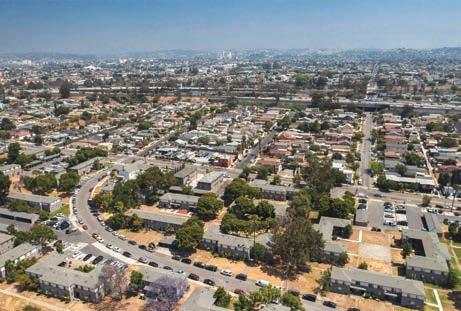
The affordability crisis is hitting our queer communities especially hard. LGBTQ+ people in LA County are more likely to rent their homes –and more likely to be cost-burdened by housing – than their straight counterparts. Queer people are twice as likely to have experienced homelessness within the past five years. For trans and nonbinary folks, the difference is even more stark. 25% of trans and nonbinary people in LA County are currently unhoused compared to 1% of the general population.
We understand that the housing shortage has been a direct result of decades of policy failures in our cities – and it’s beyond time we finally address it with urgency. If we want the Westside to remain a welcoming place –not just for the wealthy, but for everyone –we have to make it possible for more people to live here. That means building more homes.
Enter SB 79, a bill under consideration in the state legislature that would make it legal to build small apartment buildings near major transit stops. It’s desperately needed across LA —but especially in communities like ours, where access to cleaner air, strong schools, and good jobs should be available to more than
It doesn’t have to be this way.
We know that when there’s housing near transit, people use it. At stations like MacArthur Park and Wilshire/ Vermont—which are surrounded by apartments—tens of thousands of riders board each day. And when we reduce car dependence, we also reduce pollution: climate experts estimate that adding homes near transit can cut climate-warming pollution by up to 31%.
Some worry that new housing causes displacement. But history and research show the opposite. When we don’t build enough homes, demand spills over into older, more affordable neighborhoods — driving up rents and pushing low-income renters out. By making room for more people, we’re actively reducing pressure on existing tenants.
On the Westside, we’ve fallen behind. We’ve created tens of thousands of high-paying jobs, but built far fewer homes; indeed, the populations of Santa Monica, Culver City, and West Hollywood haven’t grown meaningfully in over 50 years. That stagnation, driven by restrictive zoning, has priced out all but the most affluent.
SB 79 gives us a chance to change course.
This is about more than zoning. It’s about who gets to live here and what kind of communities we want to be. Are we comfortable becoming a place of diminishing diversity, where only the wealthy can belong? Or can we foster places where teachers, nurses, service workers, artists, LGBTQ+ people, and young families can still build their future?
We’re proud to represent cities committed to tackling this crisis head-on. With SB 79, our state will take a major step toward a more affordable, inclusive future.
PHONE 310-230-5266
E-MAIL arodriguez@losangelesblade.com
INTERNET losangelesblade.com
PUBLISHED BY Los Angeles Blade, LLC
PUBLISHER
ALEXANDER RODRIGUEZ
arodriguez@losangelesblade.com, 310-230-5266 x8080
EDITORIAL
NATIONAL EDITOR
KEVIN NAFF kna @washblade.com, 202-747-2077 x8088
CONTRIBUTING WRITER
KAREN OCAMB karenocamb@losangelesblade.com
CONTRIBUTORS
MICHAEL K. LAVERS, TINASHE CHINGARANDE, CHRISTOPHER KANE, JOHN PAUL KING, LOU CHIBBARO JR., SUSAN HORNIK, JOE REBERKENNY, DANIEL ITAI, ISAAC AMEND, PETER ROSENSTEIN, TERRI SCHLICHENMEYER, JOE PHILLIPS, ANKUSH KUMAR, ESTEBAN RIOSECO, SAM KISIKA, ELVIS KAWEDO, HENRY CARNELL, DAWN ENNIS
SALES & ADMINISTRATION
SALES EXECUTIVE
SHANA WONG SOLARES swong@losangelesblade.com, 808-386-0872
MARKETING DIRECTOR
STEPHEN RUTGERS srutgers@washblade.com, 202-747-2077 x8077
NATIONAL ADVERTISING
RIVENDELL MEDIA sales@rivendellmedia.com, 212-242-6863
ADMINISTRATION
PHILLIP G. ROCKSTROH prockstroh@washblade.com, 202-747-2077 x8092
CREATIVE DESIGN/PRODUCTION
MEAGHAN JUBA production@azercreative.com DISTRIBUTION
CHRISTOPHER JACKSON, 562-826-6602
All material in the Los Angeles Blade is protected by federal copyright law and may not be reproduced without the written consent of the Los Angeles Blade. e sexual orientation of advertisers, photographers, writers and cartoonists published herein is neither inferred nor implied. e appearance of names or pictorial representation does not necessarily indicate the sexual orientation of that person or persons. Although the Los Angeles Blade is supported by many ne advertisers, we cannot accept responsibility for
50-mile radius of Los Angeles, CA. Multiple copies are available from the Los Angeles Blade ofce only. Call for rates. If you cannot reach a convenient free distribution point, you may receive a 26-week mailed subscription for $125 per year or $5.00 per single issue. Checks






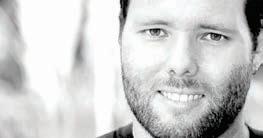
MICHAEL K. LAVERS
is the Blade’s international news editor. Reach him at mlavers@washblade.com.
President
SYRACUSE, Italy — It was shortly after 7 p.m. on July 22 when I left the beach and returned to my apartment in Ortigia, a small island in which Syracuse’s Old City is located, and turned on the television. An Italian newscast had yet another story about an AI-generated video on Truth Social that showed FBI agents arresting former President Barack Obama in the Oval Office as President Donald Trump watched.
“The Italian news all day has been reporting on Trump’s deep fake showing Obama’s arrest. Is that for real? And seriously WTF?” I asked Washington Blade White House Correspondent Chris Kane in a text that I also sent to a mutual friend.
The video that Trump shared on his social media network was fake, but it was yet another example of our commander-in-chief embarrassing our country. Not even a two-week vacation in Italy could temper the embarrassment that I feel as an American with Trump in the White House.
There are myriad other examples of Trump embarrassing our country about which I have written while abroad. Here are some examples:
• I was on assignment in the Mexican border city of Tijuana on Jan. 28 when Trump suggested, without evidence, the Biden-Harris administration’s diversity, equality, and inclusion policies could have caused the midair collision of a U.S. Army Black Hawk helicopter and an American Airlines regional jet near Reagan National Airport that left 67 people dead.
“He is doing everything possible to ensure the U.S. will no longer stand for human rights — around the world and in our own country — and basic decency,” I wrote in the Blade on Feb. 4.
• Trump on July 16, 2018, defended President Vladimir Putin during a press conference that took place in Helsinki after they met. I watched the spectacle unfold on television while I was on assignment in Mexico City.
“President Trump’s defense of Russian President Vladimir Putin on Monday after their summit in Helsinki was yet another moment when I felt embarrassed for my country while on assignment outside the U.S.,” I wrote in the Blade on July 19, 2018. “This ridiculous spectacle also proved once and for all the U.S. under this administration cannot claim with any credibility that it stands for human rights
By MICHAEL K. LAVERS

around the world.”
• Hurricane Maria on Sept. 20, 2017, devastated Puerto Rico. I was on assignment in Chile a few days later when Trump attacked then-San Juan Mayor Carmen Yulín Cruz. Our commander-in-chief later threw paper towels into a crowd at a church in Guaynabo, a suburb of the Puerto Rican capital.
“His outrageous attacks against the mayor of an American city who is doing everything possible to help her citizens survive are the latest in a long list of actions (or inactions) that have left this gay American journalist who routinely reports overseas embarrassed,” I wrote in the Blade on Oct. 2, 2017. “I am also increasingly ashamed to identify myself as an American while this man occupies the White House.”
I wrote in response to Trump’s exchange with Putin in Helsinki that American exceptionalism, “however flawed, teaches us the U.S. is a beacon of hope to those around the world who suffer persecution” and also “teaches us the
U.S. is the land of opportunity where people can build a better life for themselves and for their families.” These ideals, seven years later, ring hollow.
An optimist may think the Trump-Vance administration should spend its time on far more important things: protecting transgender people from discrimination and violence; pressuring Israeli Prime Minister Benjamin Netanyahu and his government to stop committing what two prominent Israeli human rights groups last week described as genocide in the Gaza Strip; forcing Putin to stop his war against Ukraine; ensuring undocumented immigrants in U.S. Immigration and Customs Enforcement custody have access to due process; and negotiating in good faith with trading partners. A realist may conclude these aspirations are beyond reach with the Trump-Vance administration in the White House.
Trump clearly has his own aspirations. He is a self-serving buffoon who continues to embarrass his country in the eyes of the world.
When Charles Galin King made his big debut on the world’s first drag competition show, King of Drag, you knew you were taking in a star
By NORMA LEE
When Charles Galin King made his big debut on the world’s first drag competition show, King of Drag, you knew you were taking in a star. He introduced himself as “a Mexican-American Indigenous Wixárika with Ch’ol blood person,” and you couldn’t help but take notice.
His cultural influences are apparent in his drag, serving distinct and memorable looks. He won fans over with his fabulous impression of Nosferatu on The Dong Show and connected with them through his honesty about his mental health struggles. After bringing the black plague to the prom, his time on the Revry series came to an end.
We caught up with Charles Galin King to talk about his experience on King of Drag, what he hopes to see in future seasons, and advice for new drag kings.
Tell us about your first time in drag.
Back in high school senior year, I decided to wear one of my dad’s black button-up short-sleeved shirts and made a beard and mustache on my face, and wore a fedora hat. I went out with one of my best friends to this day, Ruben, and we went to Hollywood and went to Jack and the Box. I needed the restroom and went to the women’s, and a guy coming out of the men’s said, “Not that one, this one.” And I felt validated in drag cause I was that convincing of a “man,” jajaaaja.
What made you decide to be a part of the inaugural season of King of Drag?
I wanted to try it cause I was looking at the application out of curiosity, and upon reading started feeling fear and nervousness. And said, “I should apply,” to my mother. Also, l will die one day, might as well go for it and see how it is. I knew I would be a part of the first trial and error cause it’s a first of its kind, so we all learned together what this show is and will be.
What do you hope to see differently in future seasons?
More kings on the King’s Court, and more BIPOC judges, and more lip sync songs.
What surprised you most about your experience on King of Drag?
I gained 9 new siblings and felt a beautiful connection to myself in wanting to be a part of this community even more because of them. And due to being a beautifully diverse experience.
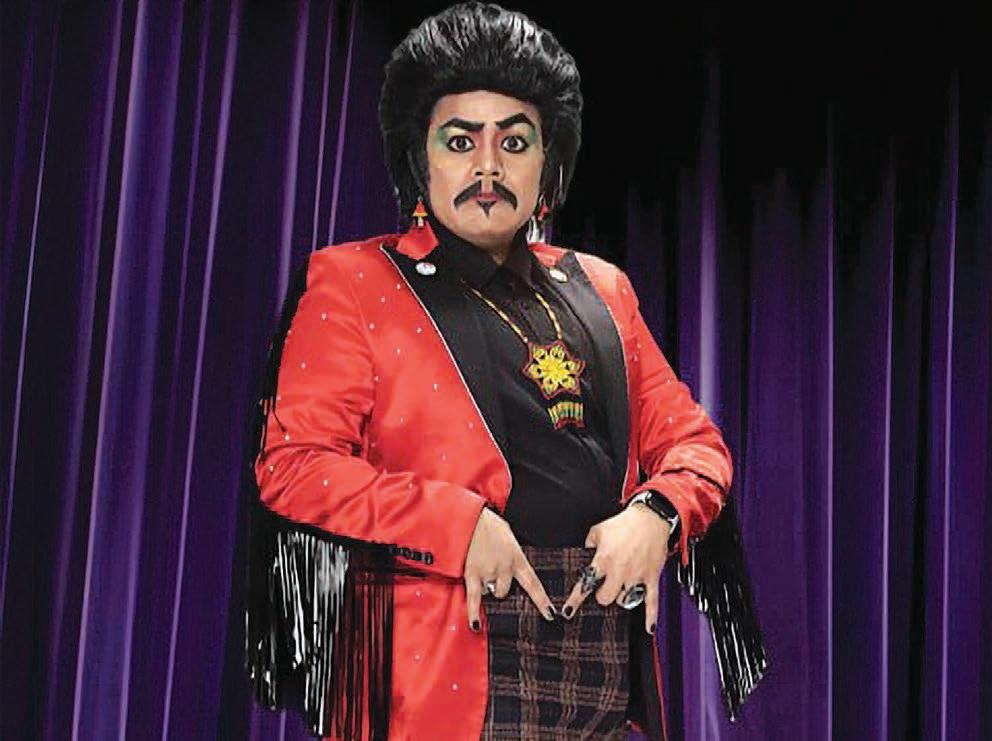
What do you cherish most about your filming experience?
I showed what drag means to me and what my drag is. And being able to say thank you to the cast, crew, tech, and owners of the studio where filming was at.
If you could do one thing over on King of Drag, knowing what you know now, what would it be?
Have more money and be able to show my true fear of cutting out a fetus from me and showing myself dying.
Have you had any especially memorable fan interactions since the show began?
Yes, when people and fans would say thank you for sharing your story about accepting death and suicide. And them asking me what surprised me most about being on the show.
Do you hear from other kings about the representation the show offers?
Yes, very much. They feel seen and have been wanting this for such a long time, and it’s a breath of fresh air seeing us all work together.. We still feel the hate from those who don’t understand our existence, though I have
ten love comments from the fans.
What do you want aspiring kings to know about the working life of a king?
Be prepared to be looked at by certain audiences with stares of confusion, and being on their phone when performing or being compared to other kings. Also, since we are still climbing to be accepted in this world, the majority of Drag Race fans still see us as non-existent and trash. Always focus on our drag king audience, for they understand us the most. Always have fun, for if I have fun, then the audience will have fun alongside me. SO many queens support us, and there are still queens who look down on us. Accept that and focus on your music, routines, lyrics, and feeling the vibes of what character you will put on stage.
If you can ask a co-star or Murray Hill one question at a season 1 reunion, what would it be?
What’s your favorite flavor of ice cream if you eat ice cream? And when can we hang out and look out to the sunset and high-five when it’s time to go home?
Stream the entire season of King of Drag now on Revry. com and follow Charles Galin King on social.
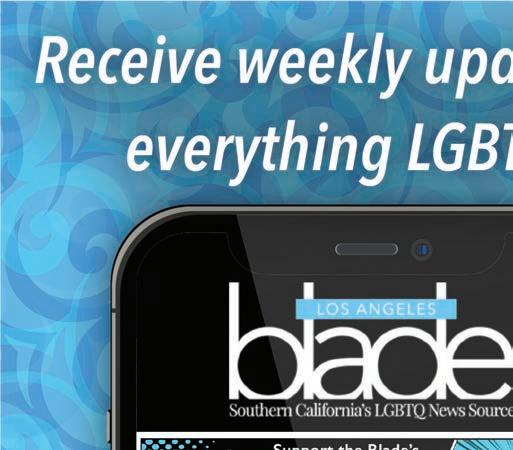

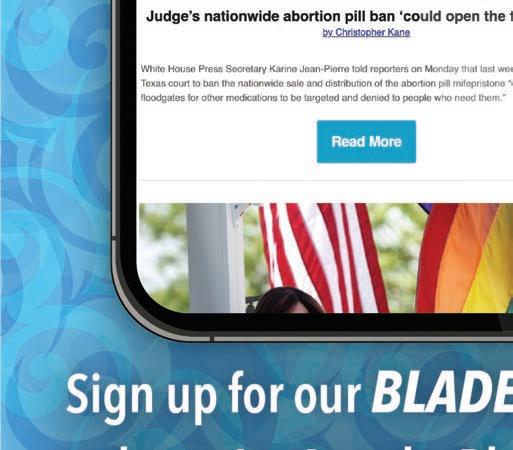





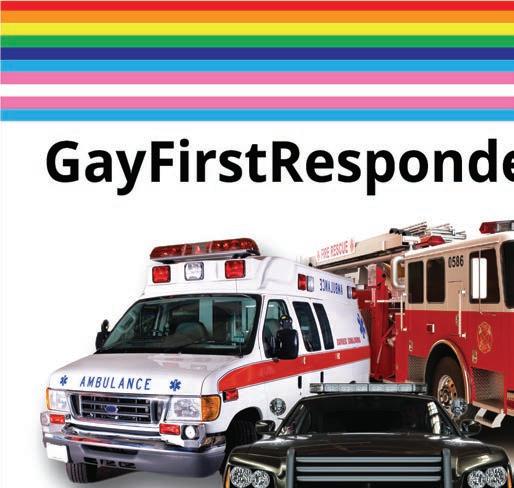
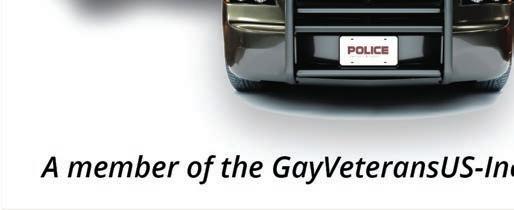


‘Taxi zum Klo’ feels authentic to anyone familiar with ‘hook-up’ culture
By JOHN PAUL KING
When “Taxi zum Klo” was released 45 years ago, it’s doubtful that anyone realized the extent to which the time and place in history it was capturing would someday be iconic — but watching it today, in a new 4K restoration which begins a multi-city “roadshow” tour in New York City this weekend, the world and the lifestyle it shows us feel not only familiar, but woven inextricably into the DNA of gay culture as we know it.
An underground sensation in West Germany upon its initial release, it made its U.S. premiere at the New York Film Festival in 1981, and was given a theatrical release in America that same year. It quickly achieved cult status, becoming a hit with queer audiences even as it became a flashpoint of controversy and a target of censorship in the repressive sociopolitical atmosphere of the Reagan era. Poised between the heady “ golden years” between the rise of Gay Liberation and the nightmare of the AIDS epidemic, it offered a then-shockingly explicit, inherently transgressive inside look at the “ secret ” world of gay Berlin, in all its promiscuous, leather-clad, gender-bent, unapologetic glory.
Written, directed, and starring Frank Ripploh, it’s a semi-autobiographical and deeply transgressive exploration of gay German life through the experiences of a schoolteacher (Ripploh), popular with his students and well-liked (though gossiped about) by his colleagues, who leads a double life in the streets of Berlin on a quest for anonymous sex with other men. One such playmate (Bernd Broaderup) becomes his lover, and they move in together, enjoying the pleasures of domestic life even as Frank continues to pursue his hedonistic obsessions; Bernd, who longs for a simpler, quieter life in the country, grows increasingly dissatisfied, but Frank, despite his genuine affection for his partner and need for the centering emotional connection their relationship provides, cannot imagine a life without the thrill of his sexual adventures, bringing him to a crossroads where he must contemplate a choice between two lives — neither of which he feels can ever deliver the complete fulfillment he desires.
Produced on a shoestring budget, with Ripploh and his cast of non-professional actors playing characters who share their real names and a cinematic style that seems equal part candid documentary and absurd comedy of manners, “ Taxi zum Klo ” feels thrillingly authentic to anyone who has ever participated in gay “ hook-up” culture — though the lifestyle it presents might also feel like a far cry from its modern equivalent, in which “ dating” apps like Grindr and Sniffies have largely replaced the non-virtual sex clubs and porno theatres of a grungier and less impersonal time. There’s no exchange of “ dick pics” here, no convenient listing of stats, likes, preferences or pronouns — just the unpredictable and potentially risky rituals of in-person connection. For those too young to remember when such things were the way of the gay world, the behavior of Frank and his various fellow “ sex-plorers” might well seem just as scandalous as it would have been to the homophobic prudes of its day. Likewise, there’s something about the film’s unabashed graphic nudity and sexual content that seems more “ obscene” than the raunchiest OnlyFans content; Ripploh’s fearless choice to show male nudity, complete with erect penises and un-simulated sex, brings a visceral (and vaguely unsanitary) reaction that’s as inflammatory as it is erotic.
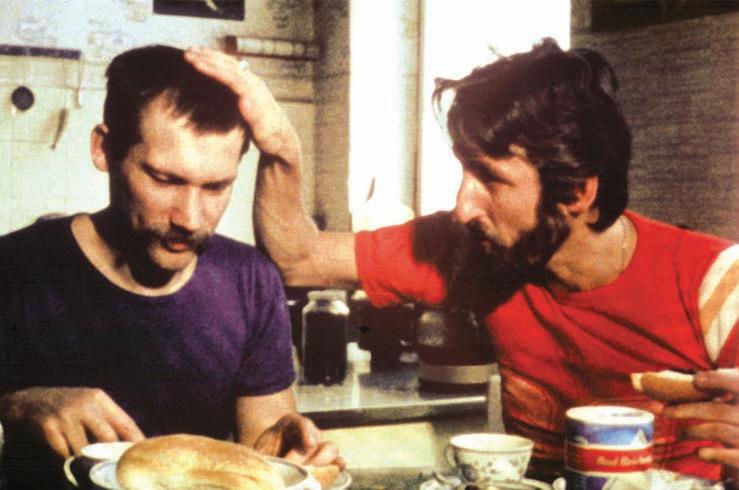
Still, Ripploh’s movie cannot help but arouse us; its raw and un-romanticized prurience makes it somehow easier for us to imagine ourselves as a participant despite (or perhaps because of) the voyeurism it evokes, and the effect is both lascivious and liberating, inviting us to embrace our sexuality as a visceral part of our queer identity — a concrete and gloriously queer touchstone of natural human experience that feels validated by the instinctual response it evokes in our physical being, defying any construct of “ appropriate ” behavior through its undeniable ability to turn us on. Ripploh, who passed away from cancer in 2002, was in real life both an actual secondary school teacher and a popular drag performance artist known as Peggy von Schnottgenberg, made “ Taxi zum Klo” while he was on probation from his job, a disciplinary action imposed by school authorities after coming out as gay on the cover of Stern Magazine in 1978. In a later interview, he said of the film:“I was not pursuing any political goals, but rather realizing purely private interests: my career as a teacher was ruined. And the film fulfilled a very simple desire for revenge, along the lines of ‘I’ll get back at you’.”
He also claimed it was not intended as a “ gay movie” at all. Rather, he described it as “a sad film that expresses the longing for a relationship and its impossibility, despite all the humor… I definitely wanted to confront two dead ends: a bourgeois dead end where someone suffocates in pillows, coffee and cake, and a dead end of pseudo-free gay sexuality where you use drugs to blur boundaries but not eliminate them.”
Although his film was made decades ago, it’s those same conflicts, as much as any “ shock value” or sex-positive embrace of our libido, that resonate with us now. While we may thrill at recognizing ourselves in its seminal portrait of liberated gay sexuality, it’s the still-potent longing to reconcile our conflicted impulses that speaks to us most urgently.
In a time when we face a struggle to keep ourselves from being shoved back into the shadows, it offers a powerful — yet still defiantly joyful — reminder that our real human struggle toward happiness on our own terms transcends all the irrelevant differences of sexual identity for which we have been continually persecuted, and inspires us to say, yet again, “ we’re here, we’re queer, get used to it.”
By JOHN PAUL KING
Few classics of the Hollywood Golden Age have stood the test of time with as much stamina as Billy Wilder’s “Sunset Boulevard.”
Released on Aug. 10, 1950, it became a near-instant classic, earning rave reviews for its savage portrayal of the very industry that produced it and the fearlessly intense performance of former silent screen goddess Gloria Swanson as tragically deranged Norma Desmond, whose fictional history mirrored her own more than enough to make the casting provocative. It was one of the year’s biggest “award season favorites,” a creative triumph for the director/ screenwriter team of Wilder and Charles Brackett, and it quickly gained a reputation — one that it largely still holds — as the best film Hollywood has ever made about itself. It would go on to become a frequently cited example of the film noir genre at its finest, a near-legendary insider’s tale of the movie industry, a meditation on the dangers of ego, the fickleness of fame, and a damning indictment of callousness within a system that exploits its best and brightest and casts them aside when they cease to be profitable. It’s inarguably a great movie, fully worth the reverence
with which it is held in the “cinephile” community — but while that’s more than enough reason to observe and celebrate its 75th anniversary, what makes the occasion noteworthy for us here at the Blade is its status as one of the most beloved “gay” film faves of all time.
Not that there’s anything explicitly “gay” about it, at least on the surface. Indeed, if you watch it at face value, it adheres more or less to conventional heterosexual “normalcy” in the specifics of its story. Struggling screenwriter Joe Gillis (William Holden) is the image of mid-century American masculinity: worldly, handsome without being “pretty” and oozing with an almost smug virility; it’s enough to make a movie star — albeit a faded one — want to make him into her own private rent boy, especially when he has talents that might help her accomplish her delusional dream of a return to stardom. Considering how he looks in those mid-century sim trunks, we can’t say we blame her.
Then there’s Norma. To say she’s larger than life is an understatement; exuding a persona that speaks of a need to be seen and acknowledged, she’s made a place for herself by commanding every room with her sheer presence.
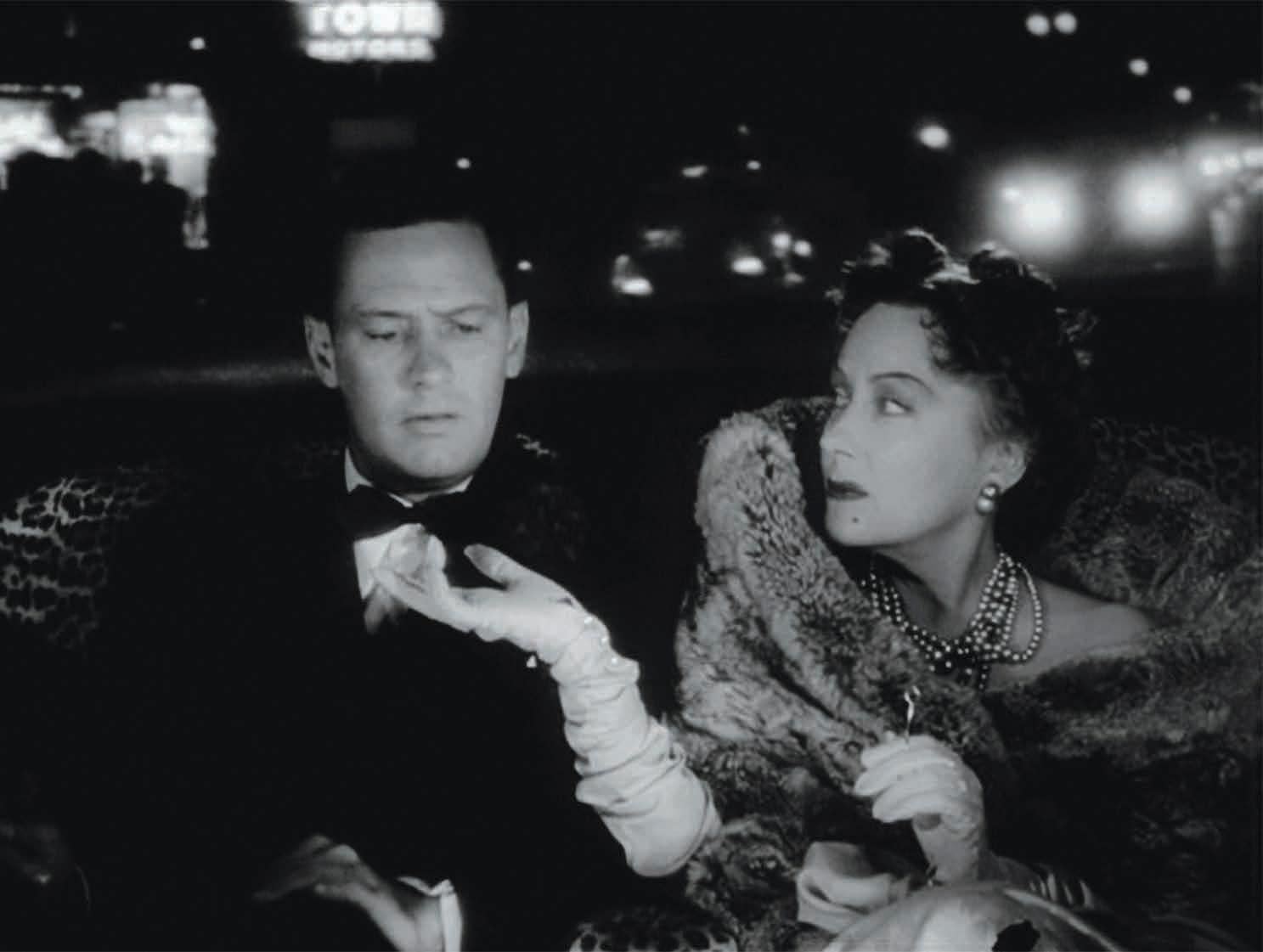
It’s an identity built on artifice, on the carefully mastered tricks of her trade — the elevated vocal expression, the broad gestures and glamorous presentation that establish her as… well, a queen. Yet she’s been rejected, cast aside in a world that no longer recognizes her glory, which worships youth and beauty and views those who are older as unwanted and irrelevant; how many queer men, especially in the repressive days of “Sunset Boulevard,” can relate?
Naturally, there’s a certain amount of camp to be found here, too, which in itself could explain the queer fascination with the movie. The exaggerated acting style of the silent screen — embodied so menacingly in Swanson’s iconic performance — adds a certain air of the ridiculous, yet somehow (like all good camp) invites our empathy, too.
That, of course, is why “Sunset Boulevard” speaks to us still after three quarters of a century: no matter how flawed, how unlikable, how misguided or how self-serving its characters might be, they are so recognizably human that we cannot help but be moved by them. Yes, it’s ultimately a black comedy, a pitch-black commentary on vanity, amorality, and self-delusion, but it’s impossible to watch without feeling a tinge of sympathy for Joe Gillis — dead in a swimming pool before he even gets to tell his own story and not even a good enough opportunist to avoid feeling sorry for the woman who will eventually put him there. It’s impossible to consider the fate of Norma Desmond — all the years of loneliness, of living in memories, of finding connection only through the fawning servitude of her exhusband-turned-loyal manservant (Erich Von Stroheim), and of finding companionship only through the proxy of a pet monkey — without becoming aware of the profound sadness of her existence. Wilder and Brackett may have been renowned for their cynicism, but they never failed to touch you with their deep sense of humanity, either. And when Joe Gillis, watching the grim nocturnal funeral for that aforementioned monkey from his window, voices his opinion that “it was all very queer,” you can be sure they chose that word on purpose.
Of course, for many queer audiences, understanding “why” they like it is not really necessary — after all, it’s an entertaining enough movie, with a wickedly transgressive attitude about social norms and constructs (the reversed gender dynamics between its two “romantic”” leads add an overall sense of discomfort for anyone who might feel vaguely threatened by such things), and if you’re a fan of old Hollywood, it offers a host of pleasures in its incorporation of real-life personalities (filmmaker Cecil B. DeMille and Hollywood gossip columnist Hedda Hopper make appearances as themselves, as do several silent stars (including Buster Keaton, Anna Q. Million, and H.B.Warner) as Norma’s “bridge circle.”
Ultimately, though, what matters most of all is that it is a film with universal appeal — a timeless story, despite its aging stylistic and technical contributions. The fact that it remains so after 75 years is testament of the universal power of cinema to speak to us regardless of when it was made.
‘The Voice of MGM’ offers new insights into beloved singer
By TERRI SCHLICHENMEYER
The monkeys used to scare you a lot.
The Wicked Witch was one thing but those flying simians with their booming voices? Ugh, they gave you nightmares for weeks. And despite that you knew how things would end – you’d seen the movie annually, for heaven’s sake – let’s just say you spent a lot of time covering your eyes. So now be like a Lion. Get uncowardly and find “Judy Garland: The Voice of MGM” by Scott Brogan.
When most people think about Judy Garland, two images come to mind: the teenager in pigtails or “The one-dimensional image of an always suffering and always tragic Garland.” Neither one, says Brogan, is totally correct. In reality, Garland was “positive, joyful, and funny.”
Her parents, Ethel and Frank Gumm, were performers who moved their little family around Michigan and Wisconsin before landing in Grand Rapids, Minn., where their youngest child, Frances, was born in 1922. An adorable baby, little Frances loved an audience almost from the time she could walk; her parents happily added her to the family troupe.
In 1926, the Gumms performed their way across the country to Los Angeles, where Frances and her sisters appeared in many shows, but critics were not entirely impressed. Still, Ethel pushed and the girls toured with Paramount Circuit in the northwest, and then in Chicago in 1934 where Frances had “one of [her] biggest career milestones.”
By 1935, she was formally using the name “Judy Garland” onstage and she’d secured informal representation. That same year, she signed a contract with MGM, a studio that took a near-total control it “would exert over Garland’s personal life” and her schedule, denying her wish to be with her father at the end of his life and dictating what she ate or didn’t eat.
Still, says Brogan, their methods worked: by the time Garland was 20 years old, her “career seemed to know no limits.”
Page through “Judy Garland: The Voice of MGM” and you’ll instantly know that you’re in for a treat: this book is loaded with photos, stills, publicity shots, and newspaper recreations. There’s a lot to look at here, but what there is to read is better.
Author Scott Brogan makes Judy Garland his raison d’être in this book, but it’s not entirely all about her. Brogan shares an overview of the movie studio that made her famous, including what is arguably her most top-of-mind film, the gossip that surrounded it then, and the mythology that still lives on. There’s a comprehensive list of World War II-era appearances that Garland made, and what happened at each one. If you’re expecting dirt-dishing, you’ll read about her father’s secret, her marriages, and her addictions, but not in an over-the-top scandalous way. Brogan is factual, inclusive, and respectful, just as you’d want.
If you’re planning on having guests soon, put “Judy Garland: The Voice of MGM” away or your guests will want to read, rather than mingle. It’s the kind of coffee-table book that, for fans, will make you Get Happy.
By Scott Brogan
c.2025, Lyons Press | $65 | 405 pages
